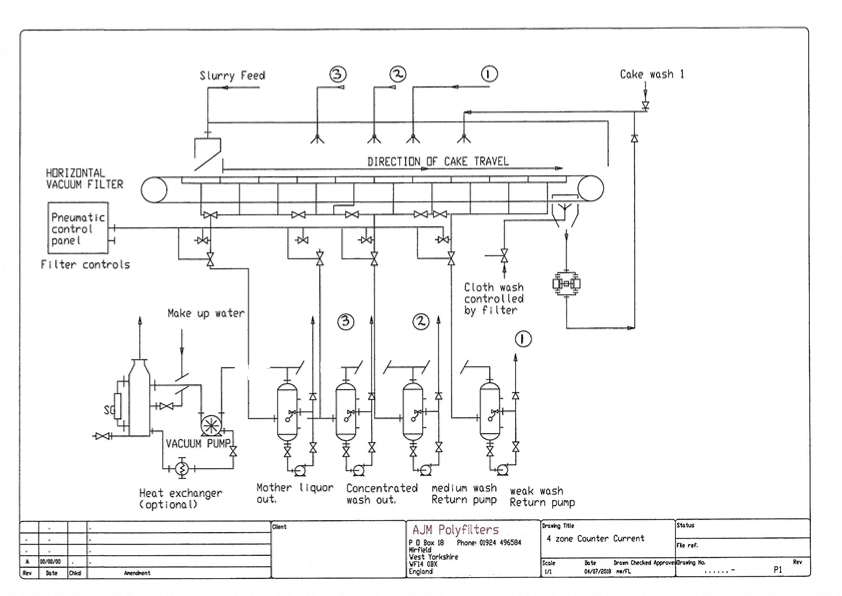Design
- Unlike
traditional Horizontal Vacuum Belt Filters, we do not need expensive
rubber carrier transporter belts, heavy steel support structures,
transporter belt wearing strips, belt tension mechanisms,
reciprocating trays, flexible tray connections, tray support rollers,
geared motors, cloth travel measurement, electrical control panels,
etc.
Materials
of Construction -
The
above is a list of the components that we DO NOT need in our design.
Our filter framework structure and index mechanism is inexpensive
compared to the HVBF. The materials of construction can be anything
which can be fabricated, such as stainless steel or polypropylene. To
index the filter we use either compressed air, or hydraulics. The
filter has no electrical requirement, making it an ideal selection in
flameproof areas. Other than the actual filter cloth, the Polyfilter
has no consumable wearing parts. Mechanical components are guaranteed
for 3 years.
Feeding
and Cake Washing -GENERAL
- Unlike the HVBF which must have a continuous supply of feed slurry
and cake washing liquid, both carefully regulated to the forward
speed of the belt, the filter cloth on the POLYFILTER is stationary,
(just like the laboratory Buchner filter), whilst filtration and cake
washing are taking place. The benefit of this is that the feed can be
applied either continuously, or, if necessary, in small volumes in
synchronisation with the filter index. The same applies to the cake
wash liquid. The actual decision depends upon the characteristics of
the product, not the design of the filter!
Cake
Washing -(1)
- Once the above is understood, it can be seen that the benefits of
plug flow washing can be exploited to full advantage. Since the cake
is stationary. any wash applied above a compartment, or zone, must
exit the filter from that zone, or, if the filter is allowed to
index, the next zone(s) along. This is particularly beneficial on
liquor recovery applications where an excess of wash liquid would
dilute the product. Additionally, by fitting valves or orifice plates
in the manifold headers, the rate of liquor flow from the filter can
be controlled. On fast filtering, open structured crystaline type
products, this ensures a better wash recovery.
Counter
Current Cake Washing -(2)
- From the above it can be seen that the Polyfilters design is ideal
for this technique of minimising wash liquor consumption. The cut
points are easily identified, and, easily adjusted, without the need
of stopping the filter. Any number of stages can be incorporated.

Cake
Drying
- On the drying end of the filter, it is possible to fit a cake
squeezing plate, which, on some products, can match the cake solids
achieved by membrane plate type filter presses. Alternatively, with
crystalline structured products, hot air tunnels can be incorporated
thus turning the filter into a simple dryer.
Cloth
Washing
- The indexing design of the Polyfilter permits very small quantities
of liquid to be used for cloth washing as the liquid only needs to be
applied as the cloth indexes. If the product is the solid, the cloth
wash liquor can be pumped back onto the filter, thus eliminating
product losses. On cake washing filters, the cloth wash can become
part, or all, of the cake wash.
Other
Applications
- Whilst being a continuous filter, the POLYFILTER vacuum belt filter
can also be used for BATCH processes. Here, its performance
flexibility has seen it out perform more traditional equipment such
as ; basket and decanter centrifuges, nutsche filters, filter presses
and enclosed pressure filters.
Batch
applications include: -
Aluminium Powder, Copper Oxide, Copper Carbonate,
Dental Polymer, PAA, Polyurethane Foam, Guignets Green, Salt